Newsletter: Sports Report: Frustration spikes as labor talks stall and MLB cancels season openers
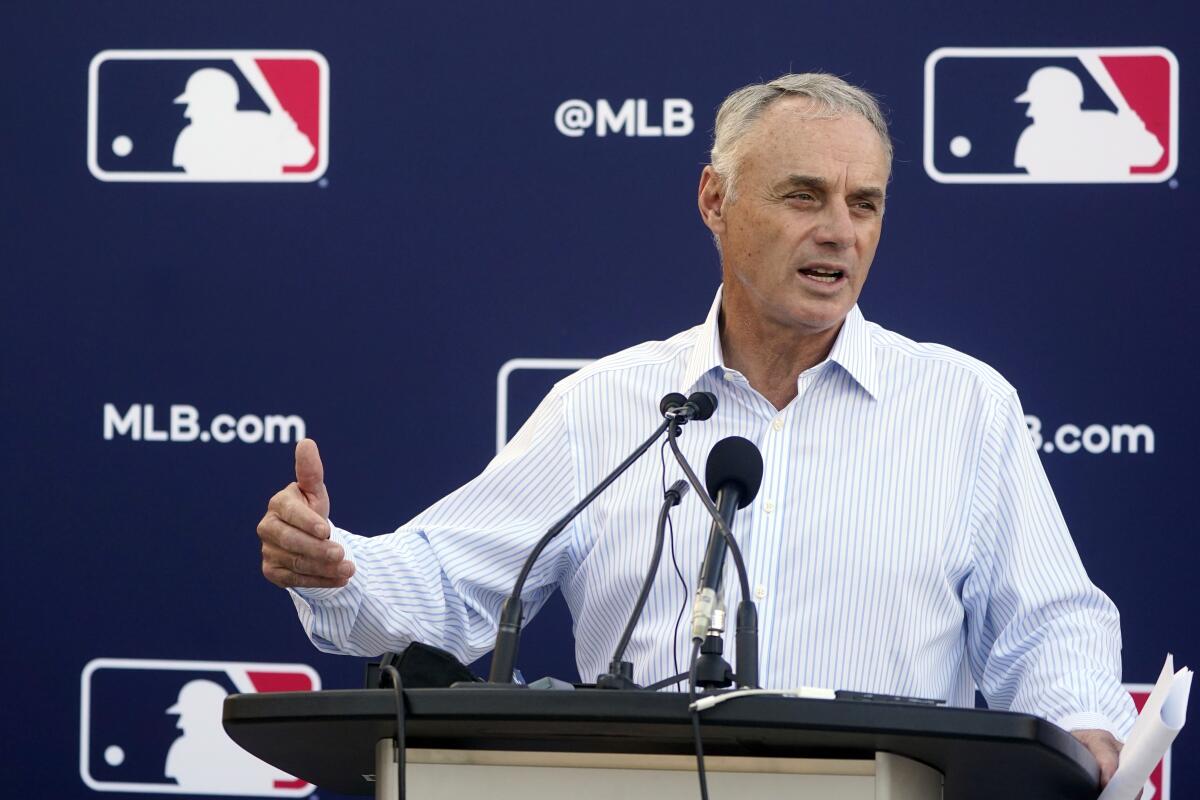
- Share via
Howdy, I’m your host, Iliana Limón Romero, filling in for Houston Mitchell. Let’s get right to the news.
From Bill Plaschke: If you had plans to attend any of the first seven games at Dodger Stadium this season, don’t bother.
Baseball is locking you out.
If you had plans to make a trip to check out Mike Trout or Shohei Ohtani in Oakland or Seattle during the season’s first week, forget it.
Baseball has torn up your tickets.
That loud and startling sound that swept across the national sports landscape Tuesday was the bolting of the gates of 30 major league stadiums for the first week of the season, with owners canceling the first two regular-season series as part of their ongoing labor dispute with the players.
Go beyond the scoreboard
Get the latest on L.A.'s teams in the daily Sports Report newsletter.
You may occasionally receive promotional content from the Los Angeles Times.
Bill Shaikin on baseball: On Tuesday, after negotiations broke off between owners and players in Major League Baseball, and three months after owners locked out players, Commissioner Rob Manfred announced he had called off opening day. Manfred did address reporters, but this is what we would have liked to hear:
“Good afternoon. Look, I know I am not popular among fans, certainly not today. I try to be as honest as I can, sometimes brutally honest. Sometimes it doesn’t come out right. I am going to do my best to be honest with you right now.
“First, I work for the owners. The best interests of the game and the best interests of the owners are not always the same. The last time a commissioner tried to lean toward the best interests of the game, the owners fired him. I’ve got an owner who has been hoping to break the players union longer than many of the players have been alive. If I’m gone, that’s what you’re going to get.
“I know how to make a deal. But I can’t do it alone.”
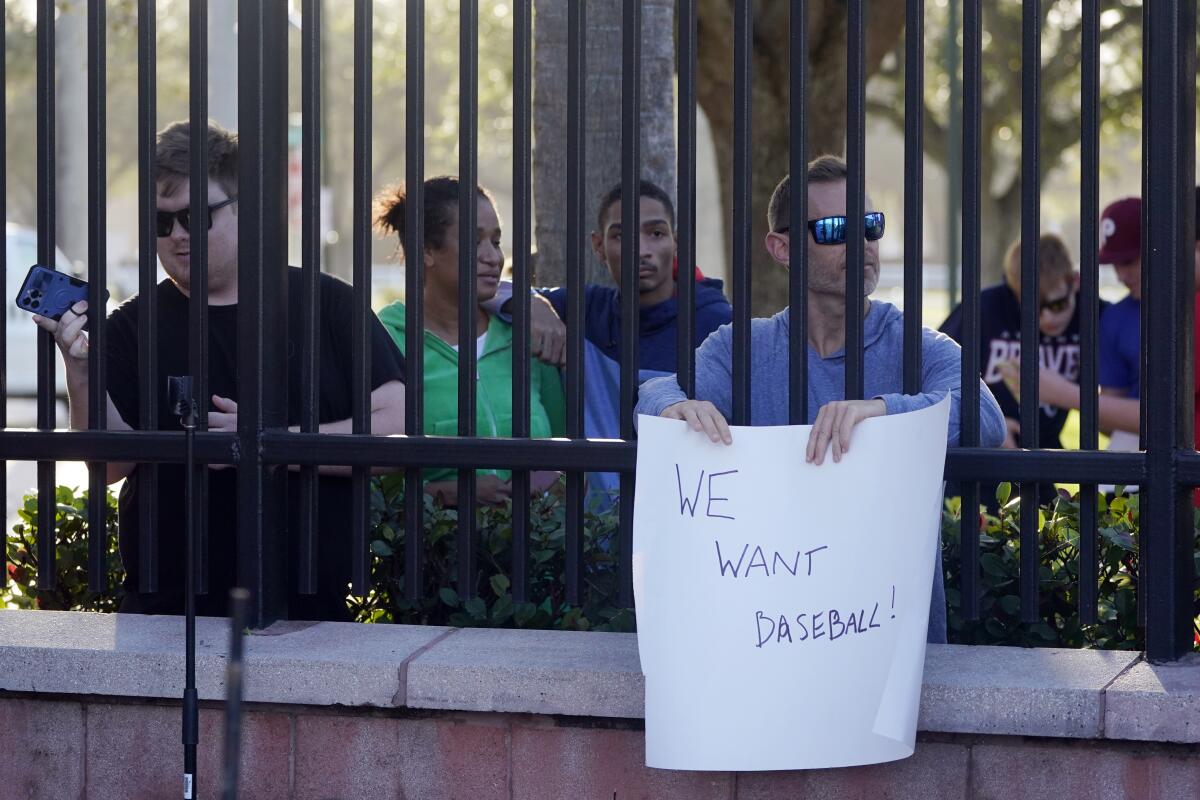
Jack Harris on the players’ reaction: By the early hours of Tuesday morning, hope seemed to be pulsing throughout baseball.
Major League Baseball owners and the players union had been negotiating deep into the night in Florida, trying to reach a new collective bargaining agreement before the league’s self-imposed deadline and save opening day.
Reports indicated compromises on key issues were within reach. For the first time since the lockout began in December, there was optimism a deal might be reached in time to save the start of the season.
By Tuesday afternoon, however, all that belief had vanished.
Instead, the owners and players exchanged last-ditch offers unsuccessfully, Commissioner Rob Manfred announced the first week of the season would be canceled, and almost everyone in the sport was left fuming, flummoxed and fed up with a process that is threatening the both the short- and long-term health of the sport.
As talks broke down, players took to social media with complaints and concerns about the owners’ tactics. Most revolved around the same frustrations.
Players felt the owners waited too long to begin seriously negotiating — the sides met only six times over more than two months before nine straight days of talks this past week.
They felt the owners pulled a public relations stunt at the last minute, leaking rumors that a deal was closer than it actually was in order to shift blame onto the union.
And they felt by canceling games amid a lockout that isn’t required in the absence of a CBA, the owners were putting their own financial interests ahead of the long-term health of the game.
“The last 24 [hours], I’d say there was cautious optimism on the players side because the owners were actually at the table negotiating with us toward a deal,” San Francisco Giants pitcher Alex Wood wrote on Twitter, as it became clear the sides weren’t going to agree. “What we’re asking is more than fair. If there’s no deal the optimism from MLB was a PR illusion to make it look like they tried.”
Toronto Blue Jays pitcher Ross Stripling told Sportsnet in Canada: “They were trying to sneak things through us; it was like they think we’re dumb baseball players and we get sleepy after midnight or something.”
Enjoying this newsletter? Consider subscribing to the Los Angeles Times
Your support helps us deliver the news that matters most. Become a subscriber.
LAKERS
From Dan Woike: LeBron James fell into the Lakers bench like a construction worker after a 16-hour day, arms and legs flying to the sides, head rolled back, looking to the ceiling.
He was exhausted, physically spent from fighting for position in the paint, mentally wiped out from another necessary comeback after the Lakers’ biggest weaknesses were mercilessly exposed by the Mavericks.
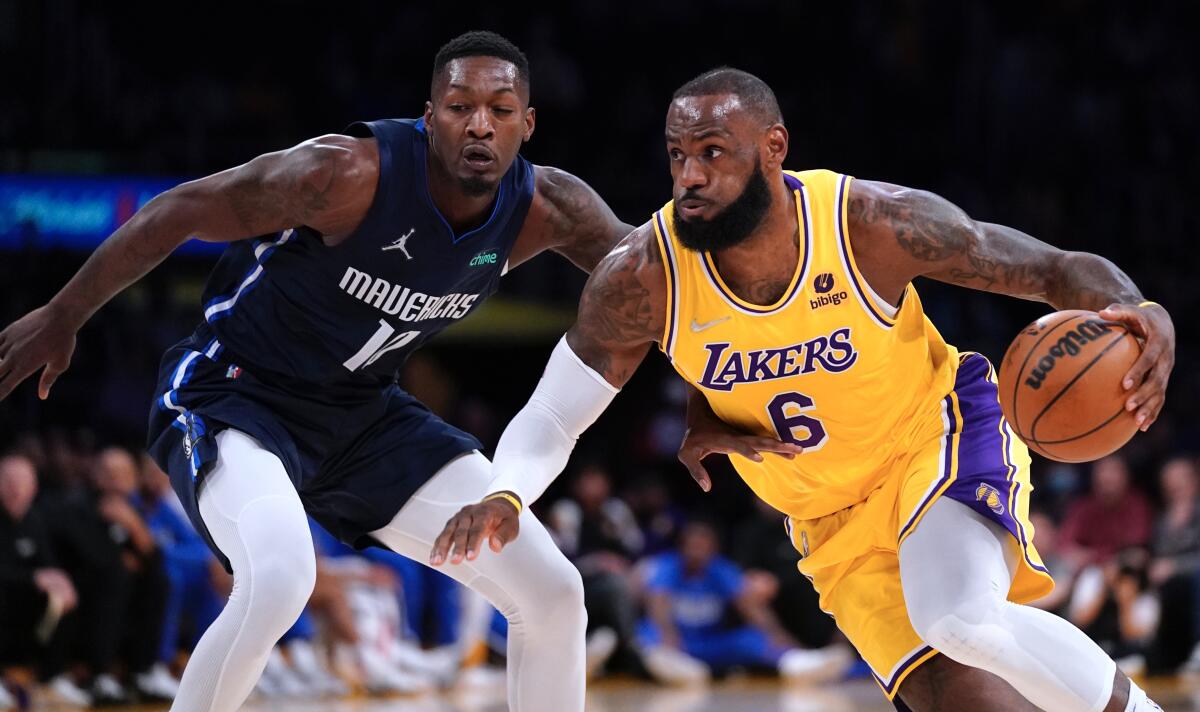
It was late in the third quarter Tuesday night at Crypto.com Arena, a flurry of James’ jumpers swinging momentum to the Lakers. But it wouldn’t stay there.
This year, it rarely has.
Slow on defense, cold on offense, frustration everywhere, the Lakers again dug a hole too deep to escape in a 109-104 loss.
CLIPPERS
From Andrew Greif: There was no need for Tyronn Lue to draw up a play on the grease board with four minutes remaining with his team leading one of the NBA’s worst by 18, and so the Clippers coach spent a fourth-quarter timeout joking with forward Robert Covington before throwing an arm around assistant Jeremy Castleberry and laughing.
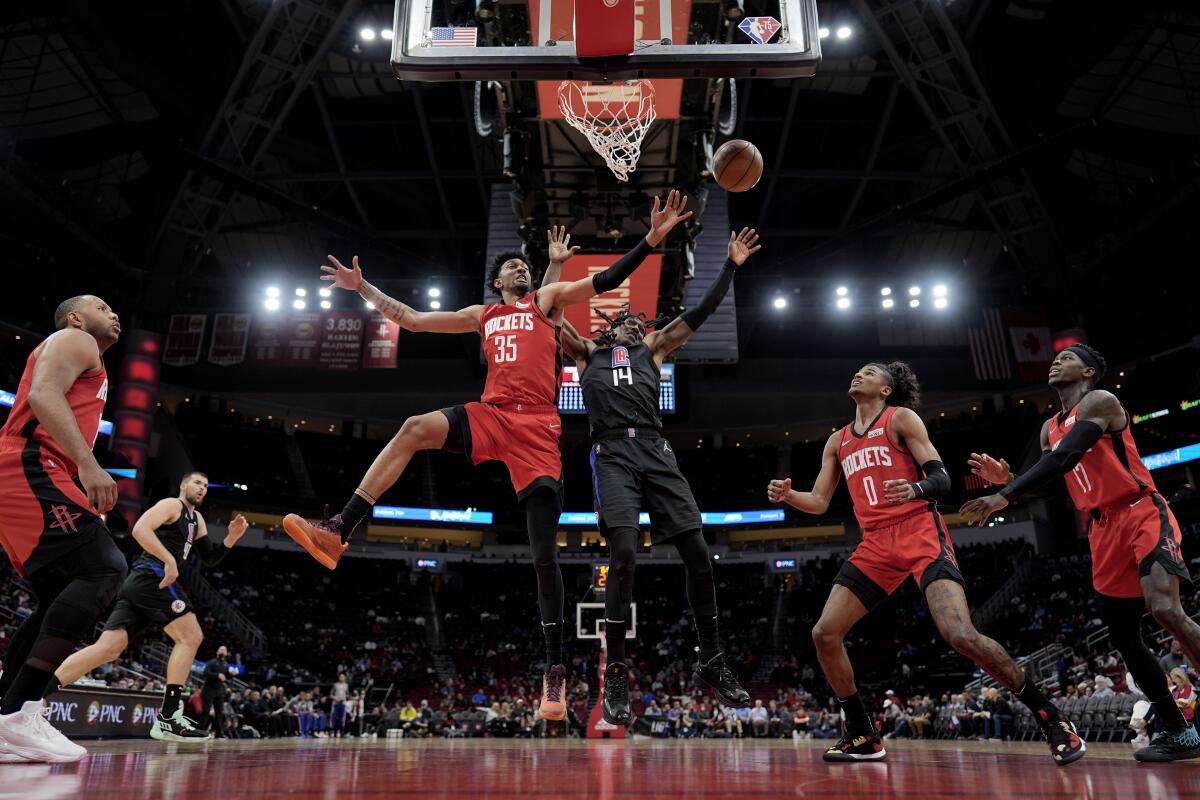
This blowout of the Houston Rockets, which ended 113-100, had been in hand since a dominant third quarter sucked any suspense out of the teams’ second matchup in three days.
It was why the most compelling question afterward was not so much how they had routed a team with a 15-46 record in what otherwise might have appeared to be a low-stakes matchup.
COLLEGE BASKETBALL
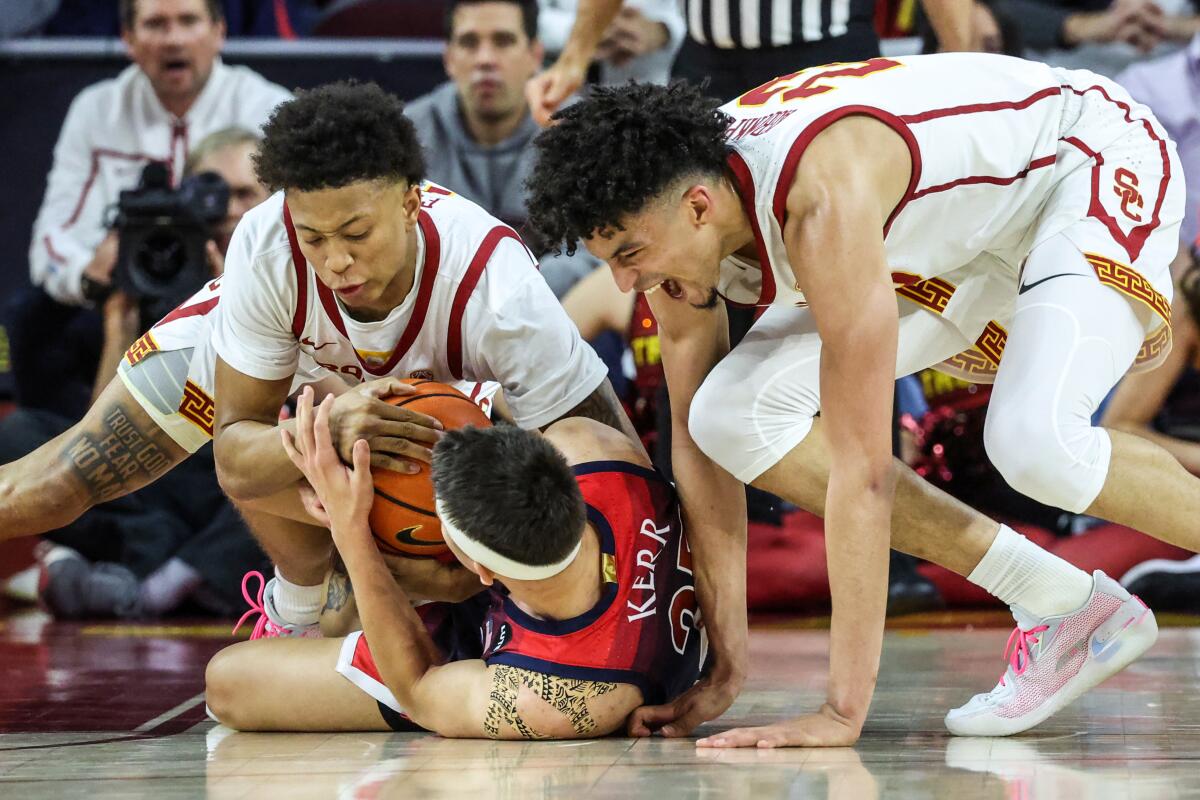
From Ryan Kartje: After three weeks of narrow, nail-biting escapes and harrowing, hold-your-breath finishes, USC finally tangled itself into a knot it couldn’t untie.
It’d been forced to contort plenty en route to a record 25 victories this season. But there would be no such late escape this time, not with Arizona tightening its grip on a Pac-12 title every chance it got until the Trojans could breathe no more, collapsing in their most lopsided loss of the season, 91-71.
By that point, a sellout Galen Center crowd dressed in all white was already walking dejectedly out of the building, barely making a fuss as Arizona celebrated alone on the court.
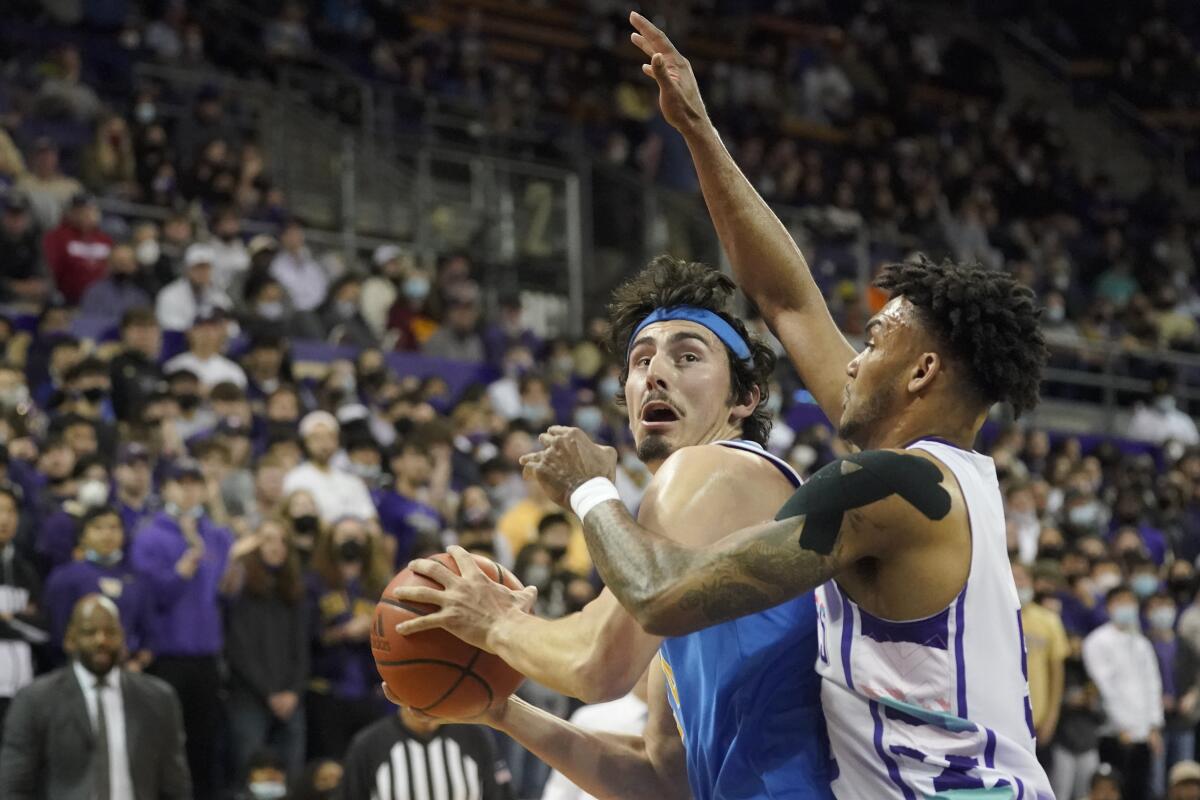
From Ben Bolch: Diplomacy is not an option in the cross-town rivalry. No matter what it takes, UCLA needs to beat USC, and it needs to do so Saturday when the teams meet at Pauley Pavilion.
“We’ve got to put our life on the line,” senior guard David Singleton, one of the handful of Bruins who have experienced any success in the series, said late Monday night.
There is no amount of exaggeration that can adequately describe how much UCLA wants to end its five-game losing streak against the Trojans, the Bruins’ longest slide against their rivals since the 1940s. Two of the losses have come on shots in the final seconds. Two have come at Pauley Pavilion.
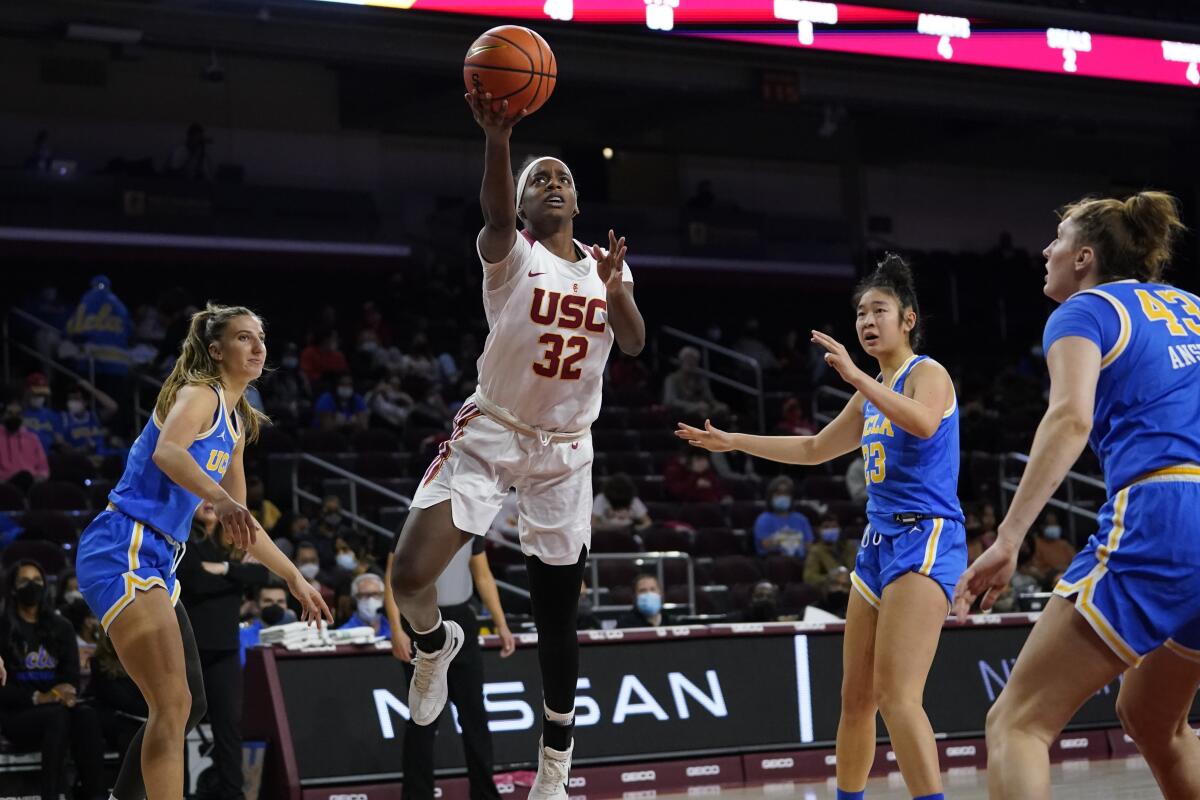
From Thuc Nhi Nguyen: Cori Close doesn’t need to look at any “bracketology” projections to know where UCLA, with a 13-11 overall record and 8-8 conference mark, stands in the NCAA tournament conversation. Entering this weekend’s Pac-12 tournament, the Bruins’ task is simple.
“We gotta win our one-game season,” the UCLA coach said. “That’s it. And then do it again.”
The No. 7 seed Bruins need a deep run in the Pac-12 tournament to secure their sixth NCAA tournament appearance. The road begins against No. 10-seed USC as the rivals face off in the first round of the Pac-12 tournament at 6 p.m. Wednesday at Michelob Ultra Arena in Las Vegas. The winner faces No. 2 seed Oregon on Thursday in the second round.
Sophomore forward Jordyn Jenkins leads the Trojans (12-15, 5-12 Pac-12) into the postseason after earning the conference’s first most improved player award Tuesday. The accolade she shared with Washington State’s Bella Murekatete marked Jenkins’ transition from role-playing freshman to standout inside scoring presence. The Kent, Wash., native more than doubled her scoring average from 6.2 points per game as a freshman to a team-high 15.2 this season while shooting 53% from the field, which ranked third in the conference.
CHARGERS
From Jeff Miller: The Chargers have a very public decision to make regarding wide receiver Mike Williams.
For now, general manager Tom Telesco is keeping his thoughts on the subject very private.
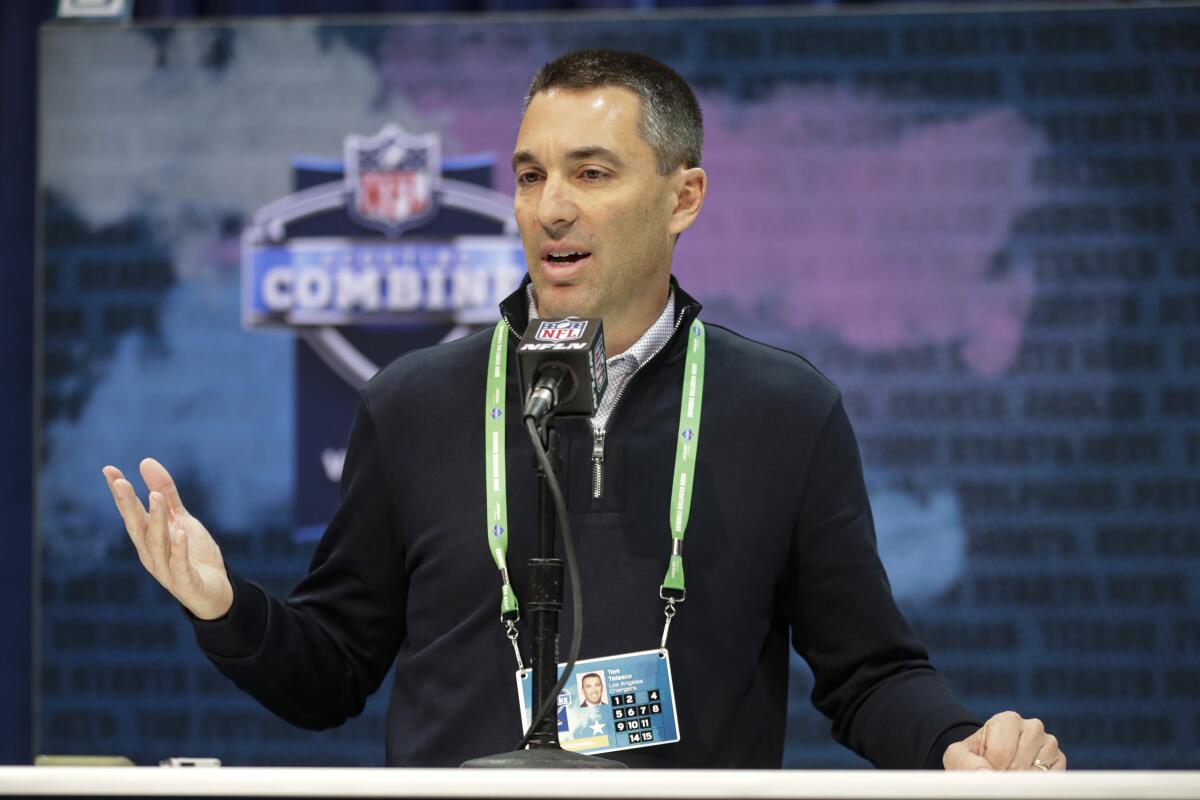
Telesco used a variation of, “I just won’t have a comment on contract plans right now,” repeatedly Tuesday when asked about Williams and others at the NFL scouting combine.
Drafted seventh overall in 2017, Williams is a pending free agent coming off his finest season. He set career highs for catches (76) and yards receiving (1,146) and had nine touchdown grabs.
The Chargers could put a franchise tag on him at a cost of about $19 million for 2022 or sign him to an extension that would lower his immediate salary cap hit but also include a greater financial commitment.
ATHLETES IN UKRAINE
From Michael Creppy Jr. on athletes stuck in Ukraine during the Russian invasion: There are very few activities and events in our global society that transcend the amalgam of socioeconomic, religious and cultural differences quite like basketball. The game’s inviting, multicultural nature has made it one of the most entertaining, inclusive sports around the world. It is a meritocracy, a connector. It doesn’t matter your culture, gender or measurements; if you can “hoop” and be an asset to a team, organized or not, you will be welcomed and accepted.
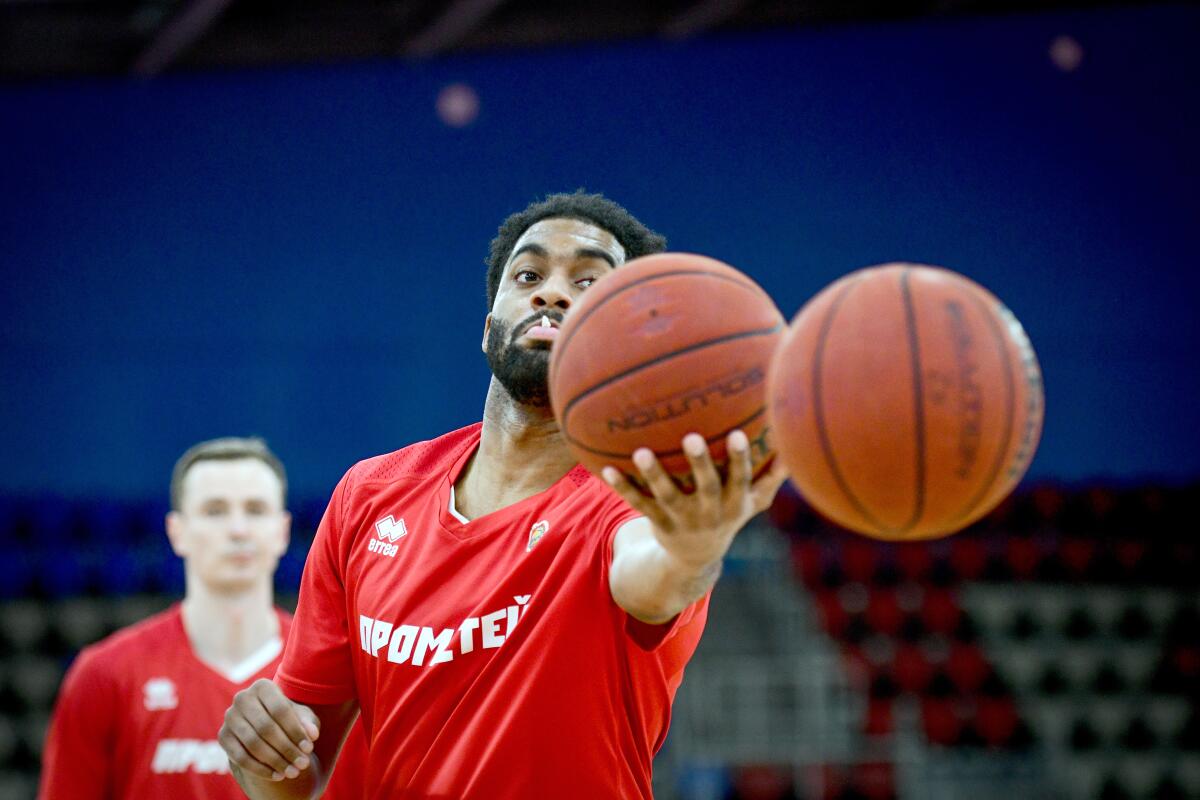
I think back to 2016 when 15 of the first 30 NBA draft picks were international players. Europe boasted nine of those 15 picks. Europe has long been viewed as the second-best basketball market for basketball talent outside of America by casual fans. However, some basketball purists — and I count myself among them — hold European basketball as the best brand of basketball development in the world. I have a unique perspective regarding international basketball in Europe, having played eight of the 10 years of my professional basketball career in Europe (England, Denmark, Germany, Greece, Portugal, Czech Republic, and Spain).
For most aspiring basketball players, the NBA is the ultimate goal. However, for the tens of thousands who don’t make the League, “overseas” becomes their target. There are numerous professional basketball markets around the world with theopportunity to become a pro, see the world and provide for your family while doing what you love.
HIGH SCHOOLS
From Eric Sondheimer: In the middle of South Los Angeles, at a golf course located on Charlie Sifford Drive, a new generation of Black golfers showed up to display passion and commitment to learning and mastering the sport. One by one, boys and girls as young as 3 years old arrived carrying golf clubs.
Each had an inspiring story to tell while attending the Cameron Champ Foundation Junior Clinic at Chester Washington Golf Course.
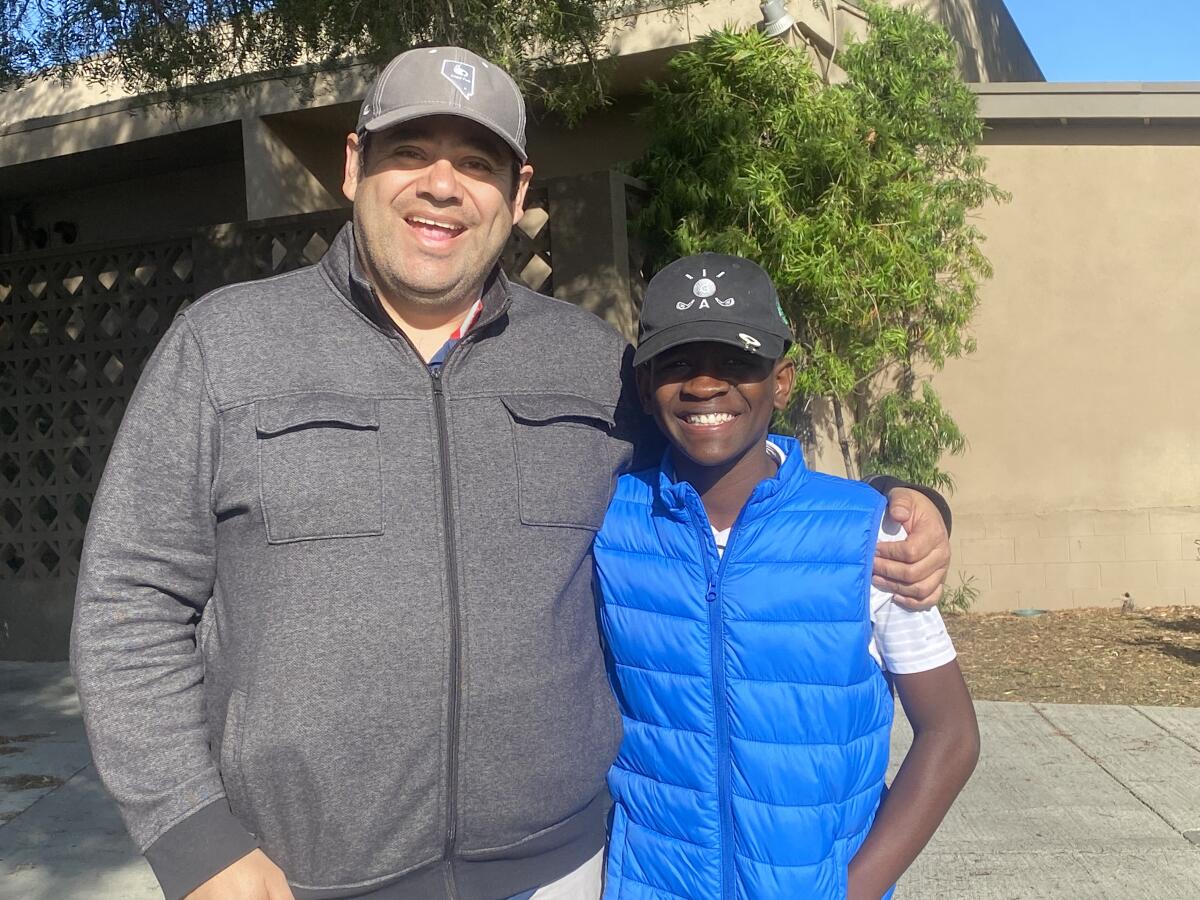
There was 13-year-old Pierre Campa. He was 18 months old when the Campa family from Riverside adopted him in Haiti just days after that country’s destructive 2010 earthquake. At 5, he saw a movie on Netflix titled “The Short Game” about the best 7-year-old golfers competing at a Pinehurst Resort golf course in North Carolina. Suddenly he was hitting a ball in the house with a plastic flute. His father figured out he was trying to play golf. The rest is history.
Campa can drive a ball 250 yards, plays in junior tournaments and hangs out at a golf course in Jurupa Hills. He became a U.S. citizen, loves PGA star Jordan Spieth and wants to keep playing golf. His father, Eddie, has even learned the sport. “I learned to be a good caddy,” he said.
MORE HIGH SCHOOL RESULTS:
State playoffs roundup: Rob Diaz scores 37 points in JSerra’s win over Fairfax
Roundup: Bryce Rainer hits three-run home run to power Harvard-Westlake
High school basketball: Regional playoff results and updated pairings
High school soccer: Southern California regional playoff results and updated pairings
On this date
1918 — Joe Malone is held scoreless in the Montreal Canadiens’ 5-3 season-ending loss to the Toronto Arenas, but finishes the first NHL season with a League-high 44 goals in 22 games. The 44 goals remains an NHL record that stands until 1944-45, when Maurice Richard scores 50 goals in 50 games.
1921 — Kentucky beats Georgia 20-19 in the Southern Intercollegiate men’s basketball championship game in Atlanta. The 14-team conference does not keep formal regular season standings. It’s college basketball’s first tournament.
1929 — The Chicago Black Hawks score a goal to snap their NHL record eight-game scoreless streak. Chicago scores twice to beat the Montreal Maroons 2-1.
1940 — Seabiscuit, ridden by Red Pollard, wins the Santa Anita Handicap in his final race. Beaten by a nose in both the 1937 and 1938 Santa Anita Handicaps, Seabiscuit beats Kayak II by 1 1-2 lengths to retire as the leading money-winning horse in the world.
1951 — In the first NBA All-Star Game, Ed Macauley of the Celtics scores 20 points to lead the East to a 111-94 victory at Boston Garden.
1951 — St. John’s Bob Zawoluk scores 65 points to lead the Redmen to a 105-61 rout of St. Peters. It’s the first time in its 43-year history that St. John’s scores over 100 points in a game.
1962 — Wilt Chamberlain scores an NBA-record 100 points to lead the Philadelphia Warriors to a 169-147 triumph over the New York Knicks. Chamberlain scores 59 second-half points and 28 points from the free-throw line for records.
1966 — Chicago’s Bobby Hull becomes the first NHL player to have two 50-goal seasons when he scores a third-period goal in the Black Hawks’ 5-4 victory over the Detroit Red Wings.
1969 — Boston’s Phil Esposito becomes the first NHL player to score 100 points in a season, scoring a goal in the Bruins’ 4-0 victory over the Pittsburgh Penguins.
1991 — Chris Corchiani of North carolina State becomes first player in NCAA history to hand out 1,000 assists in a career. Corchiani, who has 12 assists in the game, gets the milestone with 1:16 left in the first half on a pass to Rodney Monroe. Wake Forest spoils the day with an 89-84 win.
1991 — Del Ballard Jr. throws the most famous gutter ball in PBA Tour history in the finals of the Fair Lanes Open. Ballard, needing seven pins on his last roll to beat Pete Weber, gets none as his ball falls into the gutter. Weber wins 213-207, claiming the $30,000 first prize, while Ballard takes $15,500.
2011 — Pittsburgh overcomes a slow start to clinch at least a share of the Big East regular-season championship with a 66-50 win over South Florida. Pitt coach Jamie Dixon sets an NCAA Division I record for most victories in the first eight seasons of a career with 214 — one more than Everett Case had at North Carolina State and Roy Williams had at Kansas in their first eight years.
2012 — Major League Baseball expands its playoff format to 10 teams, adding a second wild-card in each league. The decision establishes a one-game, wild-card round in each league between the teams with the best records who are not division winners.
2018 — Kristina Vogel of Germany wins a record-tying 11th women’s world cycling title when she takes the individual sprint at the track world championships in Apeldoorn, Netherlands. Vogel ties Anna Meares’ record for most women’s world titles.
And finally
Amid the Lakers’ struggles, LeBron James continues to deliver highlight plays. Watch him connect from the logo:
Until next time...
That concludes today’s newsletter. If you have any feedback, ideas for improvement or things you’d like to see, email me at houston.mitchell@latimes.com, and follow me on Twitter at @latimeshouston. To get this newsletter in your inbox, click here.
Go beyond the scoreboard
Get the latest on L.A.'s teams in the daily Sports Report newsletter.
You may occasionally receive promotional content from the Los Angeles Times.




